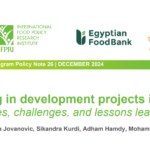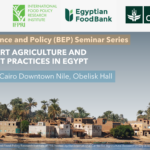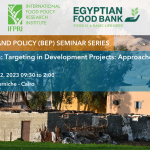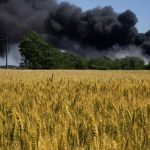Effective targeting strategies are vital for almost all development programs. Universal approaches which provide aid to all individuals regardless of need are not always feasible given limited budgets and varying development priorities. Conversely, targeting directs resources to those in greatest need, ensures efficient allocation while upholding principles of social justice, equality, and the right to assistance.
BEP Seminar Series: Climate-smart agriculture and development practices in Egypt
Egypt stands at a critical juncture, facing significant environmental stresses exacerbated by climate change, despite being a relatively minor contributor[1] to global greenhouse gas emissions. The nation’s already hot and arid climate is experiencing increasing average temperatures, with projections indicating continued increases. Climate change significantly impacts Egypt’s agricultural sector[2], a vital contributor to the country’s GDP, foreign cash reserves, food security, and employment. Absent adaptation, rising temperatures, increased land salinity due to rising sea levels in the Nile Delta, limited surface water resources and rapid exploitation of groundwater resources will reduce agricultural productivity in the future.
روسيا تنهي مبادرة حبوب البحر الأسود: ماذا بعد لأوكرانيا والعالم؟
كان من المقرر تجديد الصفقة، التي تم وضعها قبل عام تقريبًا، للمرة الرابعة. في غضون ساعات من الإعلان، شنت روسيا هجومًا صاروخيًا على ميناء أوديسا. في اليوم التالي، أدت الهجمات الصاروخية الروسية على منشآت مناولة الحبوب الرئيسية في أوكرانيا إلى ارتفاع أسعار عقود القمح الآجلة إلى أكبر ارتفاع لها في يوم واحد منذ فبراير 2022. وبحسب ما ورد علقت شركة تأمين على الشحن تعمل بموجب الاتفاقية تغطيتها لشحنات الحبوب الأوكرانية في البحر الأسود.
BEP Seminar Series | Roundtable Discussion | Targeting in Development projects: Approaches, challenges, and lessons learned
SFSD, EFB, and IFPRI are excited to announce a forthcoming session as a first the second in the Bridging Evidence and Policy (BEP) Seminar Series. This upcoming session will take the form of a roundtable discussions, gathering experts and development implementers around the theme of “Targeting in Development Projects”. Targeting eligible beneficiaries in governmental and non-profit development programs is a challenging endeavor that requires a deep understanding about the different methodologies, and which is suitable for each program.
The Russia-Ukraine Conflict and Global Food Security
When Russia invaded Ukraine in February 2022, sparking fears of a global food crisis, IFPRI responded rapidly to the need for information and policy advice to address the crisis. From the first moments of the conflict, a new IFPRI blog series provided critical information and insights into the impacts on food security, caused by rising food, fertilizer, and fuel prices and trade disruptions, for vulnerable countries and regions.





